- Home
- Bonnie Leon
Joy Takes Flight Page 21
Joy Takes Flight Read online
Page 21
“But I’m working . . . as a doctor.”
“That is a gift, but it’s not the one I’m speaking of. It’s you, your heart and kindness and deep affection for family that you’ve hidden from the ones who love you.”
“After what happened, I couldn’t stay. You know that. Susan was everywhere. It felt as if I couldn’t breathe because of her presence and her absence.” Without warning, the impact of her loss swept over Paul, as if she had just died. “Why, Mother? I don’t understand why God let her die.”
“Susan was here as long as she was meant to be. Her days were numbered before she was even born.”
Paul shook his head. “Her life was cut short because of me. Just because God knew doesn’t mean he wanted her to die. We were meant to have a life together—I can’t forgive him for snatching her away from me. I can’t forgive myself for not stepping in.” He sat on the chair, unable to hold back his tears. “If I had done what I should have, she and my son would still be here.”
His mother reached out and took his hand. “Oh my dear son, I wish I knew all the answers. I don’t. But I do know that you didn’t kill your wife. You did all you could.”
Paul’s chest felt as if it would explode. “I love Kate, but I still miss Susan.”
“Love once born never leaves us.” She stopped and took a small breath. “Soon I’ll see sweet Susan and my grandson.” She smiled. “And my granddaughter. Oh, to hold them . . .” Her eyes brimmed with tears. “I want to tell Susan that you’re well.”
Paul wished he could assure his mother that he was happy and content, but there was still a dark place inside of him that threatened to destroy everyone he loved, including Kate. He pressed his mother’s hand to his cheek. “I don’t want you to go.”
“I know.” She struggled for her next breath. “But I’m ready. Soon I’ll see your father and so many others. And I’ll stand before the Lord. I can’t even begin to imagine the wonder of it.” She stopped and seemed to rest, then opened her eyes. “There’s something more I must say.”
Her voice was weakening. Paul could barely understand her.
“We are born, we live, and we die. The time goes by quickly, like a morning mist swept away by the warmth of the sun. Don’t throw away the moments.” She rested her hand on his, her skin frail and paper thin. “Tell your Kate hello from me.”
- 19 -
Paul remained at his mother’s side through the night. His brothers and sisters sat with him much of the time. He felt like he was part of a death watch as her breathing became more labored. Robert’s wife, Mary, made sure there was coffee and tea, and sometime around midnight she baked a pound cake, sliced it, and set it out, but no one ate any of it.
Carolyn sat beside Paul and leaned over her mother, holding her hand. “Mama, it’s all right if you want to go now. We’ll be all right.” Her eyes glistened. “You’d be so proud of Charles. He’s watching over the children and even managed to get them into bed. He’s reading Gulliver’s Travels to them.” Her words sounded like they had been choked off and she pressed her mother’s hand to her cheek. “I love you, Mama.” She gently set her mother’s hand on the cushions, glanced at Paul, and rushed out of the room.
When Esther Anderson breathed her last, morning light defined the outside edges of the draperies. Paul had hoped she would awaken, even if just for a moment, but she never did. He caressed her hand. There was no need to tell anyone right away. Just a few more moments alone would be all right.
He gazed at her. She looked peaceful, the lines of her face had softened and her lips were lifted in a quiet smile. Wisps of gray hair curled around her face, reminding him of a halo. As much death as he’d seen, it always took his breath from him. One moment a person was part of the world and the next they were gone—from flesh to spirit in an instant. He leaned his forehead against the bed and cried.
Hearing a sound at the door, he stood and wiped his eyes. Robert opened the door and stepped inside. Audrey walked in behind him.
“Is she gone?” Robert asked.
Paul nodded. He couldn’t speak.
Audrey rushed to the bed. “Mama. Oh Mama.” She draped herself over her mother and sobbed.
As Paul walked toward the door, Robert grasped his arm and Paul rested his hand on his. “I’ll tell the others,” Paul said and walked out, wishing Kate were with him.
After everyone had been told, Paul went to the phone and called the house in Anchorage. “I’m sorry, sir, but there’s no answer,” the operator said.
Paul could barely manage his disappointment. “Can you dial another number for me?”
“Certainly.”
Paul gave her the name and number of the airfield, then waited while she made the connection.
Jack answered and the operator said, “I have your party for you, sir.”
“Paul. Long time since we heard from you,” Jack said.
“I was wondering if Kate was around.”
“Nope. She’s out on a run today. She’ll be back late.”
“Can you have her call me, here at my mother’s house?”
“Sure thing,” Jack said. “Everything all right there?”
“Yeah. Everything’s fine.” Paul wasn’t about to talk to Jack about what had happened. “Thank you,” he said and hung up.
Audrey spent the day sobbing into a handkerchief, while Carolyn took on the tasks of final arrangements. There was a lot to attend to, but Audrey said she couldn’t bear to even think of it. Sean, looking morose, managed to be too busy. Robert had court hearings that couldn’t be delayed. So preparations for the funeral were left to Paul and Carolyn. She put in a call to the mortician. Within the hour, two men showed up and their mother’s body was taken.
Carolyn managed to get Audrey to take care of laundering the bedclothes while she and Paul made a visit to the mortuary. They met with the mortician to fill out paperwork, choose a casket, and order a headstone. The place of burial had long since been chosen and paid for. Their mother would lie beside their father.
Paul had taken his cue from Carolyn and had remained stoic throughout the process. She’d never openly shown her emotions. When Paul dropped her at the house, she had a list of tasks that needed her attention. Paul gratefully retreated to the beach. When he reached a place to pull off, he sat in the car and stared at the open water. A brisk breeze kicked up whitecaps and seagulls dipped and soared on the wind currents. Paul wondered what it would feel like to be one of those gulls—with nothing to think about except the moment.
With a heavy sigh, he left the car and walked onto the beach. Hands tucked inside his coat pockets, he ambled along the rocky shore. Small waves lapped at the beach, carrying white foam onto the sand. Wind caught at his hair and made his eyes water.
He’d hoped for solace, but there was none. He’d never known a world without his mother in it. It didn’t seem right. Even when he lived far from home, he found comfort knowing she was here. He bent over and picked up a broken shell, remembering all the trips to the beach his family had taken together. Searching for undamaged shells had been one of his mother’s favorite pastimes. She’d exclaim over each and every one, cleaning off dirt and sand, and then showing it off to the children before adding it to her collection.
Tears burned his eyes. Why had he waited so long to return? He’d been a fool. With ferocity, he cast the shell back into the ocean. His frustration and grief exploded in one word. “No!” A sob escaped and he sank to his knees. His mother had needed him. Susan had needed him. Kate had needed him. And he’d let them all down.
Now, he needed Kate. He longed for her loving arms and the warmth of her body, her strength and her faith that was so much like his mother’s—steady and immovable. Kate would know what to say.
A rain squall washed in from the sea and drove Paul off the beach and to the shelter of his car. He didn’t want to go back to the house. But what if Kate called him? He had to be there. In his mind he made plans to leave. The sooner he got back to Alaska, the b
etter.
He remembered the day he’d left San Francisco after Susan died. He’d run. He’d left his family when they needed him. His stomach lurched, and for a moment he thought he might get sick. Was he about to let them down again?
Paul awakened the morning of his mother’s funeral and moved to the window. Fog had moved in during the night and blanketed the city. He glanced at the clock—nine. He’d better get showered and dressed.
After a simple breakfast, it was time to leave for the church. Paul stepped out the front door and into sunshine. He lifted his face to its warmth, then looked at green lawns and holly wreaths. He’d almost forgotten Christmas was only weeks away. It seemed strange to have spring weather at this time of year. Taking in a lungful of fresh air, he walked to the car and opened the door for Audrey, who slid onto the backseat. Sean sat up front. No one spoke.
Carolyn, with the help of her husband, got their children into their Buick sedan. They followed Paul when he pulled onto the street.
The church barely had enough seating for all who had come to pay their respects. Esther Anderson had been admired and loved by many. Paul sat between Robert and Audrey in the front pew. If only Kate were with him. He needed her. They’d talked the previous day, but only for a few minutes. She was on her way back to the airfield. She’d offered him all the solace she could, long distance. It hadn’t been enough.
The scent of lemon oil and wood polish mingled with the fragrance of flowers stung his nose. Paul’s mind wandered to his home on Bear Creek. He longed to be where the scent of spruce and pine filled the air and the quiet of a snow-laden forest calmed his spirit.
Reverend Tyson had been Esther Anderson’s pastor for more than thirty years. When he stepped to a wooden podium in the front of the church, Paul could see the sorrow that lay behind his eyes. He swiped graying hair off his forehead, laid his hands on an open Bible lying on the podium, and gazed out at the people who had gathered to say farewell. He smiled kindly. “Thank you for being here. Esther had many friends. We’ll miss her.”
Paul didn’t hear any more. His mind was caught up in memories of his mother and father, brothers and sisters. They’d shared so many good times.
The minister moved to a high-backed chair and sat. Robert walked to the lectern. He’d been chosen to speak for the family. He looked calm, but Paul could see perspiration shimmer on his upper lip and on his forehead. He stood for a moment and looked out over the sanctuary and the people gathered there, then his eyes rested on the casket at the front. Paul had tried to avoid looking at it. He didn’t want to think about his mother lying in a box. It still didn’t seem possible.
Robert began with stories of his mother and father and how they had parented in unity. He told tales about himself and his brothers and sisters and the mischief they’d often gotten into. He explained that their mother was a no-nonsense kind of woman who also distributed grace liberally.
Paul remembered her steadfast faith and love. Even after his absence she’d accepted him back with loving arms. Gratitude washed over him. Thank you for her, Lord.
After the service, Paul and his brothers and three additional friends carried the coffin to a hearse that waited in front of the church, then family climbed into cars and followed the vehicle through the streets of San Francisco to the cemetery. The coffin was set in place and then family and friends gathered around. Sunshine warmed the grasses. The trees were bare, but they didn’t look stark. He gazed at his father’s headstone. They’re together now. Paul tried to still his quivering chin.
After the funeral service, people gathered at the house on Franklin Street. Carolyn had refused the help of caterers and had done up the dining table and serving table beautifully, using the family’s finest tablecloths and best silver. She’d arranged brightly colored flowers in crystal vases and set them out. And she’d prepared a simple meal with the help from women in the church. Everything was perfect. Paul stood beside her and placed an arm around her, giving her a gentle squeeze. “Mom would have loved this.”
She looked up at him, her eyelashes wet with tears, and then leaned against him. “Thank you.” She rested against him for a moment, then said, “I’d better see to our guests.” She hurried off.
Conversations eddied around Paul, but they sounded hollow to him. He wasn’t sure what he should do or say. He was approached again and again with condolences. Each time, he answered with what he hoped was a proper response, but the whole time he wondered why people put themselves through all of this. It seemed meaningless. He supposed it was a way of letting go. All he wanted was time alone.
He walked into the parlor, thankful to find it empty. He stood at the window and stared out at the lawns. His nephew John wandered into the room. He didn’t say anything as he roamed about, looking at family photographs.
Finally, the youngster stopped and stood beside Paul and gazed out of the window. “Grandmother loved her gardens. But this spring she won’t be here to tend to them.” He was quiet for a long while, then he asked, “Do you know what heaven’s like?”
“No. Not really. Except that it’s a place where there is no pain or suffering and that everyone who lives there is happy. The Bible talks about how beautiful it is, like nothing we’ve ever seen.”
“So, do you think Grandma’s happy?”
“Absolutely,” Paul said, though he wasn’t certain of that. He wasn’t certain of anything just now. “She’s with Grandpa. You know how much they loved each other.”
Tears spilled onto the boy’s cheeks. “I miss her. Why did she have to die?”
Paul circled an arm around John and pulled him close. “I don’t know, but she had a long life.”
The two stood like that for a few minutes longer and then John stepped away. “Thank you, Uncle Paul,” he said and then walked out of the room.
An ache tightened in Paul’s chest as he watched the boy leave. Why was life filled with so much sorrow? If Kate were here, she’d help make sense of it all.
Someone cleared their throat and Paul turned to see his friend and old colleague Walter Henley standing in the doorway.
“Do you mind a little company?” Walter asked.
“Of course not. Come in.”
“I’m sorry about your mother. She was a fine woman.”
“Yes. She was.” Paul reached for Walter’s hand. “It’s good to see you, friend. It’s been too long.” The two embraced and patted each other on the back. “Come and sit down.” Paul moved toward a settee. “You’re looking . . . worn out. And a little thicker around the middle.” He gave his friend a teasing smile.
Walter patted his stomach. “My wife’s a good cook.” He folded his tall frame onto a cushioned chair across from Paul. “And as to being worn out, I am. Can’t keep up with all the people who are sick with the flu. And I’m getting old.”
“You’re not so old. You only have a few gray hairs.” Paul studied Walter for a moment. “I like the gray in your beard. You look distinguished.”
Walter stroked the tidy beard. “So, what have you been up to in the great Alaskan wilderness? I heard you’re working as a doctor.”
“That’s right. And I like it. I fly into the bush, from village to village, plus I stop at some of the mining camps and homesteaders’ places. It’s always interesting. Out there, you never know what you’re going to be faced with. One night I did an appendectomy on a kitchen table.”
Walter shook his head. “You always were one for adventure. We could sure use someone like you at the hospital, especially now with the influenza outbreak. I can barely keep up with my regular patients—I’m spending too much time at the hospital.” He leveled serious eyes on Paul. “I really could use an extra hand.”
“I wouldn’t know what to do anymore. It’s been so long.”
“You’d get the hang of it in no time. Even with this flu, it’s probably easier than what you do in Alaska.”
“Why the shortage of doctors?”
“You know—attrition, plus the city�
�s population is growing. And whenever there’s an outbreak of any kind, we have trouble keeping up. When I left the hospital last night, the hallways had patients lined up on cots. There aren’t enough beds.”
“I’d like to help, but I’ll be heading home soon . . . after the reading of the will. Kate’s waiting for me.” Paul felt a prick of guilt. He should stay . . . but Kate needed him. He needed her.
Walter nodded. “I understand. How is that wife of yours? I’d like to meet her. She sounds rather remarkable.”
“She is.” Paul didn’t want Walter to know about the baby. There’d be questions and the circumstances were too similar to what had happened with Susan. It’d be like digging into a festered wound.
“So, is she still flying?”
“Oh yes. Can’t keep her on the ground. She’s a good pilot. We make a lot of runs together.”
Walter leaned back and crossed one leg over the other. “I was serious about needing a doctor to help, but I could also use you . . . long term. And there’s plenty of work for pilots in the area. I’m sure Kate could find a job with one of the local outfits.”
Paul wasn’t sure what to say. The idea of moving down had crossed his mind. That way he’d be close to his family and still be able to work as a doctor. And Kate could fly.
“Kate and I are happy in Alaska,” he said. “It suits us. And we’re needed there. Aren’t many doctors and there are never enough good pilots.” Even as he spoke, he imagined what life for him and Kate would be like in San Francisco. “Maybe you should give up city living and lend a hand in the wilderness?”
Walter laughed. “Me? You’ve got to be kidding. Don’t get me wrong. I’d love a little adventure, but to actually move? My Julia would never stand for it.”

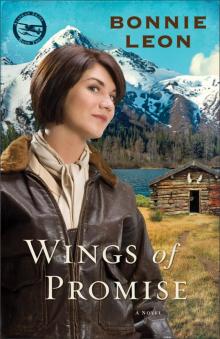 Wings of Promise
Wings of Promise Touching the Clouds
Touching the Clouds Joy Takes Flight
Joy Takes Flight Enduring Love
Enduring Love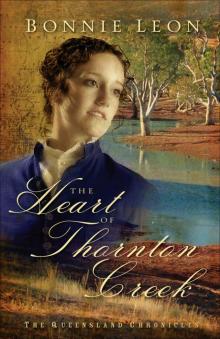 The Heart of Thornton Creek
The Heart of Thornton Creek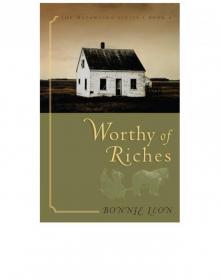 Worthy of Riches
Worthy of Riches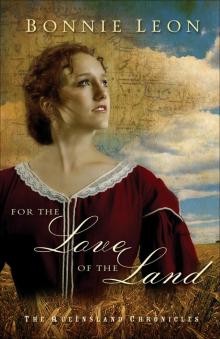 For the Love of the Land
For the Love of the Land To Love Anew
To Love Anew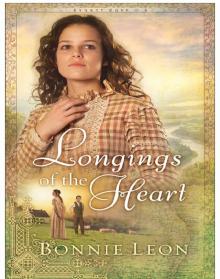 Longings of the Heart
Longings of the Heart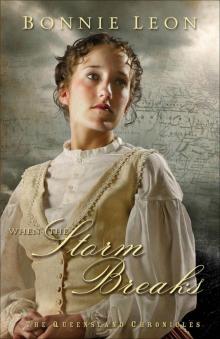 When the Storm Breaks
When the Storm Breaks